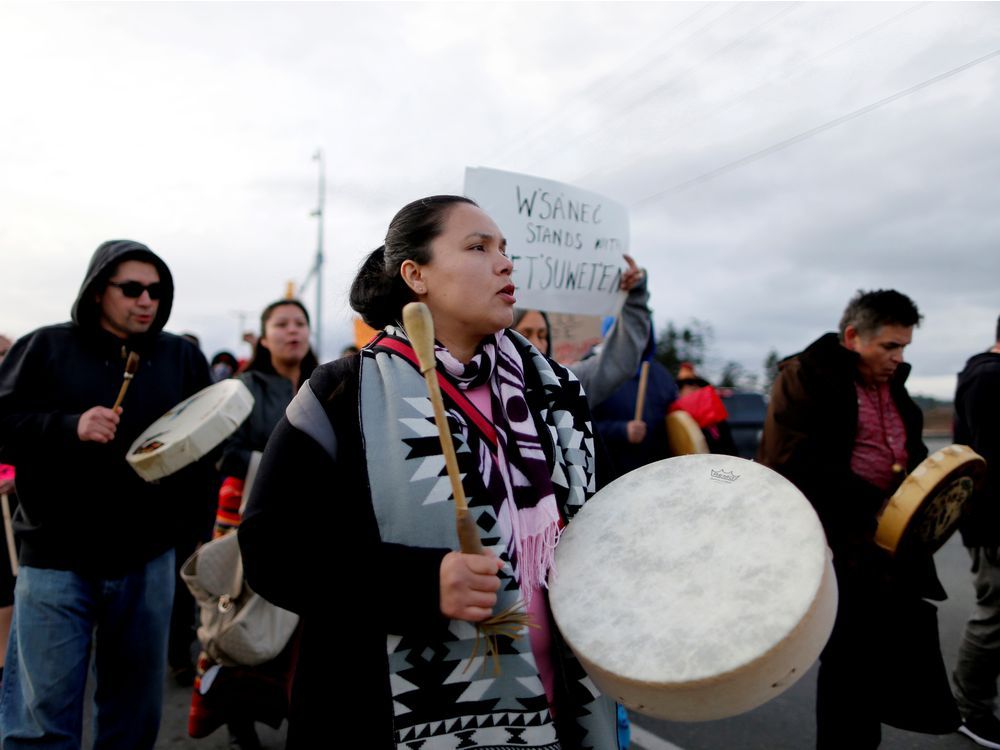Members of the Secwepemc, Tsleil Waututh and Wet’suwet’en nations are calling on the federal government to stop building pipelines after a United Nations committee condemned Canada’s treatment of Indigenous peoples.
Content of the article
Several First Nations groups are calling on the federal government to halt pipeline production in British Columbia after a United Nations committee again condemned Canada for its treatment of Indigenous peoples.
Advertisement 2
Content of the article
In the letter of April 29 to the Canadian government, the UN Committee on the Elimination of Racial Discrimination says provincial and federal governments have authorized increased force and criminalization by the RCMP against “defenders of the land and peaceful protesters” indigenous.
The letter, which is the third sent to the government, also says that despite repeated calls for Canada to end forced evictions of Indigenous people, efforts to deport and incarcerate have only increased.
The committee says it has received information that the governments of British Columbia and Canada “have not taken steps to engage in consultation with the Secwepemc and Wet’suwet’en peoples regarding the Trans Mountain Pipeline and the Coastal Pipeline. Gas Link”.
Advertisement 3
Content of the article
He also says there are concerns that the situation will deteriorate the rights of indigenous peoples, “in particular the rights to their lands and territories, the right to be consulted and the right to security of person”.
Members of the Wet’suwet’en, Tsleil Waututh and Secwepemc nations held a joint press conference Wednesday morning to call on Canada to suspend construction of the Coastal Gaslink and Trans Mountain pipelines, remove the RCMP from their lands and end to police repression of their members.
Sleydo Molly Wickham, a member and mother of the Gidimt’en clan, said she was arrested twice and was terrified as she “stared at the barrel of a gun”.
“This problem will be never to go a way until the Governments of this country to acknowledge our inherent sovereignty,” Wickham said at the press conference.
Advertisement 4
Content of the article
“The first step is for stop the construction of this project and get out of our territories immediately. Anything less flow the standardization of racism in this country and is in direct breach of the covenant.”
Indigenous activist Kanahus Manuel, a member of the Tiny House Warriors group, said his people were subject to “constant harassment” by the RCMP and wanted the world to understand that their human rights were being violated by violent arrests.
“Have been do not as afraid or fearful for to go international. It is the only way that have been To go for to have our rights and our Title recognized,” Manuel said.
Chief Judy Wilson, secretary-treasurer of UBCIC, said Canada must stop these pipeline projects because of the climate crisis.
Advertisement 5
Content of the article
“Canada can not base the decisions on only industry,” Wilson said at the press conference. “They need for base the the decisions on the future, who the earth defenders and the water protectors are saying that they are Do,”
In a press release, the Wet’suwet’en, Secwepemc and Tsleil-Waututh say the letter signals “growing international concern about Canada’s human rights record and ongoing human and Indigenous rights violations against defenders lands “.
In November, members of the Gidimt’en clan ordered all Coastal GasLink employees out of Wet’suwet’en territory in interior British Columbia. However, Coastal GasLink said an injunction from the British Columbia Supreme Court allows the company to have “safe and continuous access” to the area.
All 20 elected councils of First Nations along the pipeline route approved the project, but the Wet’suwet’en hereditary chiefs of the nation’s five clans asserted that the project had no authority without consent through their traditional governance system.
Advertising 6
Content of the article
The governments of British Columbia and Canada have yet to respond to this call to halt construction of the pipeline.
In November, Public Safety Minister Mike Farnworth said Wet’suwet’en lockdowns had jeopardized emergency access and delivery of essential services to more than 500 Coastal GasLink workers.
In response to the protests and police enforcement of the pipeline project injunction, the government engaged former Haida Nation President Miles Richardson as an interlocutor to encourage dialogue between the parties. These talks were unsuccessful.
Farnworth said the Coastal GasLink project provides jobs and economic opportunity for thousands of people in northern British Columbia, including First Nations communities.
The Coastal GasLink project has all the necessary permits for the work and the government has spent more than $1.25 billion, including more than $1 billion awarded to Indigenous-owned businesses or joint venture partnerships, according to the government of British Columbia.
More soon…
—with files from The Canadian Press







More Stories
🌱 Rail In Roanoke Fifth Anniversary + ‘Love Letters’ Production
Industrial production in South Korea contracts by 1.8% in September
PM Modi lays foundation stone for C-295 transport aircraft production plant